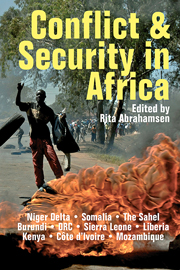Book contents
- Frontmatter
- Contents
- Preface
- Notes on Contributors
- Permissions
- 1 Introduction: Conflict & Security in Africa
- Section One Global Economies, State Collapse & Conflicts
- Section Two Global Security Governance
- Section Three Cultures of Conflict & Insecurity
- 11 The Political Economy of Sacrifice: Kinois & the State
- 12 A City under Siege: Banditry & Modes of Accumulation in Nairobi, 1991–2004
- 13 Côte d'Ivoire: Patriotism, Ethno-Nationalism & other African Modes of Self-Writing
- 14 Beyond Civil Society: Child Soldiers as Citizens in Mozambique
- Index
14 - Beyond Civil Society: Child Soldiers as Citizens in Mozambique
from Section Three - Cultures of Conflict & Insecurity
Published online by Cambridge University Press: 05 October 2013
- Frontmatter
- Contents
- Preface
- Notes on Contributors
- Permissions
- 1 Introduction: Conflict & Security in Africa
- Section One Global Economies, State Collapse & Conflicts
- Section Two Global Security Governance
- Section Three Cultures of Conflict & Insecurity
- 11 The Political Economy of Sacrifice: Kinois & the State
- 12 A City under Siege: Banditry & Modes of Accumulation in Nairobi, 1991–2004
- 13 Côte d'Ivoire: Patriotism, Ethno-Nationalism & other African Modes of Self-Writing
- 14 Beyond Civil Society: Child Soldiers as Citizens in Mozambique
- Index
Summary
The conditions match any of the most terrifying and depraved suffered by past generations afflicted by war. Yet the victims are not only soldiers. At the beginning of this century, 90% of war casualties in the world were military; today about 90% are civilian. Yet even this sobering UNDP (1994) figure does not name the problem, for the term ‘civilian’ obfuscates the vulnerability and innocence of child victims. The conditions for children who are forced to bear arms erase the traditional analytical categories of military, civilian and child. An estimated 300,000 children under 18, some as young as five years old, are currently serving in 36 wars around the world (Brett and McCallin 1998:19, 24).
In some of the wars, traditional gender distinctions have also been erased, as girls are forced to bear arms and boys are forced to render sexual service. Both have been used as cannon fodder (for example, Liberia, Uganda) advanced as the first wave of infantry-style assaults with the purpose of inhibiting the enemy, who may be reluctant to fire at children.
By employing the case of Mozambique, this study first raises the question of why children face this new technique of abuse. The military answer is easy: in the last 20 years, modern technology has provided weapons which weigh less than seven pounds, cost about US$6, and can be stripped, reassembled, loaded and fired by an illiterate child of 10. The social, political and economic answers are more difficult.
- Type
- Chapter
- Information
- Conflict and Security in Africa , pp. 209 - 224Publisher: Boydell & BrewerPrint publication year: 2013



